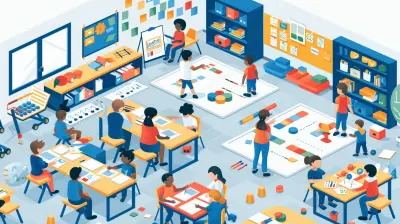Encouraging Independent Learning at Home
30 May 2025
As parents, teachers, or guardians, we all want to see our children succeed not just in school, but in life. And guess what? One of the best ways to ensure that is by encouraging independent learning at home. But what does that actually mean, and how can we foster this kind of learning in a way that's both fun and effective?
Independent learning isn't about leaving your child to their own devices (literally or figuratively). It's about helping them learn how to learn—to become curious, self-motivated, and confident in their ability to tackle challenges. In this article, we'll dive into what independent learning is, why it's so crucial, and how you can encourage it in your own home.

What is Independent Learning?
Before we get into the "how," let's first understand the "what." Independent learning refers to the ability of a learner to take charge of their own education. It's when kids develop the skills and mindset needed to explore topics, solve problems, and pursue their own interests without constant guidance or supervision.Now, this doesn't mean your child will never need your help. But it does mean they're developing the confidence and resourcefulness to seek out answers on their own before coming to you for assistance. Think of it like teaching them to fish rather than giving them the fish every time.
Independent learning isn't just about academics either. It also includes life skills like time management, problem-solving, and even emotional intelligence. These are skills that will serve them well in school, but more importantly, in life.

The Importance of Independent Learning
Alright, we know what independent learning is, but why is it so important? Let me tell you—it’s more than just a buzzword in education circles. Here are a few reasons why fostering independent learning at home can be a game-changer for your child's development:1. Boosts Confidence and Self-Esteem
When children learn to solve problems on their own or accomplish tasks without constant help, it gives them a massive confidence boost. They start to realize they're capable of figuring things out on their own. This sense of accomplishment can spill over into other areas of their lives, making them more self-assured in social situations, extracurricular activities, and beyond.2. Encourages Critical Thinking
Independent learners are often better at thinking critically. Instead of just memorizing facts, they learn to ask questions, make connections, and explore different perspectives. This analytical mindset is invaluable, not just in school but in real-world situations where they'll need to evaluate information and make informed decisions.3. Promotes Lifelong Learning
One of the most significant benefits of independent learning is that it fosters a love of learning. When kids are encouraged to explore topics on their own, they often discover passions or interests they might not have found in a traditional classroom setting. This love of learning can last a lifetime, making them more adaptable and curious adults.4. Improves Time Management and Organization
When kids are responsible for their own learning, they start to develop essential time management and organizational skills. They learn how to balance their studies with their free time, set goals, and plan their work. These skills are useful not only for academic success but also for managing daily tasks and responsibilities as they grow older.5. Prepares Them for the Real World
In the real world, there’s no teacher handing you assignments or a parent reminding you to do your homework (at least, we hope not!). Independent learning equips kids with the tools they’ll need to thrive in adulthood. Whether they’re pursuing higher education, entering the workforce, or starting their own business, self-directed learning will be crucial to their success.
How to Encourage Independent Learning at Home
Okay, so independent learning is clearly important, but how can you actually encourage it at home? Here are some practical, easy-to-implement strategies to get you started.1. Create a Learning Environment
First things first, you need to set up an environment that encourages learning. This doesn’t mean you need to transform your home into a mini-classroom, but having a dedicated space for your child to work can make a big difference. A quiet, clutter-free area with access to necessary resources (like books, a computer, or art supplies) can help foster focus and creativity.But beyond the physical setup, it's also important to create a mental environment that promotes learning. Encourage curiosity, ask open-ended questions, and celebrate effort over results. When your child sees that learning is valued and celebrated at home, they’ll be more inclined to pursue it independently.
2. Let Them Follow Their Interests
One of the best ways to foster independent learning is by allowing your child to pursue their own interests. If they’re fascinated by dinosaurs, encourage them to read books, watch documentaries, or even create their own "dinosaur research project." When kids are passionate about a subject, they’re much more likely to dive deep into it on their own.It’s okay if their interests don’t align with the school curriculum all the time. The important thing is that they’re engaging in the process of self-directed learning. Over time, they’ll develop the skills and habits that can be applied to any subject.
3. Teach Them How to Research
Independent learning doesn’t mean figuring everything out alone without any tools. Quite the opposite—successful independent learners are resourceful. Teach your child how to effectively research a topic. Show them how to use the internet wisely (Google can be both a blessing and a curse!), how to find reliable sources, and how to ask the right questions.For younger kids, you can start by doing research together, guiding them through the process. As they get older, encourage them to take the lead in finding answers to their questions. Over time, they’ll become more adept at navigating the vast sea of information available to them.
4. Set Goals and Encourage Reflection
Setting goals is a powerful way to motivate independent learners. You can help your child set short-term and long-term learning goals, whether it’s finishing a book, mastering a new skill, or completing a project. The key here is to let them take ownership of the goals. Of course, you can guide them, but the more involved they are in the process, the more invested they’ll be in the outcome.Once goals are set, encourage regular reflection. Ask them questions like, "What did you learn today?" or "What was the most challenging part of your project?" Reflecting on their learning helps kids internalize the process and recognize their progress, which is crucial for building confidence and motivation.
5. Encourage Problem-Solving
When your child encounters a challenge (and they will), resist the urge to swoop in and fix it for them. Instead, encourage problem-solving. Ask them questions like, "What do you think you could try next?" or "Have you considered another approach?" This helps them develop critical thinking skills and teaches them that they have the ability to overcome obstacles.It’s okay if they get frustrated—that’s part of the process. Learning how to manage frustration and push through challenges is a valuable life skill that will serve them well beyond the classroom.
6. Be a Role Model
Kids are always watching, and they learn a lot by observing the adults around them. If you want to encourage independent learning, be a role model. Show them that you are a lifelong learner too. Whether it’s reading a book, taking up a new hobby, or solving a problem at work, let them see you engage in the learning process.You can even make learning a family activity. For example, you could take on a project together, like learning a new language or researching a topic of mutual interest. When kids see that learning is a natural part of life, they’re more likely to adopt the same mindset.
7. Celebrate Effort, Not Just Results
Finally, it’s essential to celebrate effort, not just results. Independent learning is a journey, and there will be bumps along the way. Your child might not always get the right answer or achieve their goal on the first try, but that’s okay. What’s important is that they’re putting in the effort and learning from their experiences.By focusing on the process rather than the outcome, you’re helping your child develop a growth mindset—the belief that abilities can be developed through hard work and perseverance. This mindset is crucial for fostering independent learning and long-term success.

Wrapping It All Up
Encouraging independent learning at home doesn’t have to be complicated or time-consuming. It’s about creating an environment where curiosity is nurtured, effort is celebrated, and kids are empowered to take charge of their own learning. By following these tips, you can help your child develop the skills and mindset they need to become confident, self-motivated learners—both now and in the future.Remember, independent learning is a lifelong skill, and the habits your child develops now will serve them well throughout their academic journey and beyond. So, take a deep breath, trust the process, and enjoy watching your child blossom into a capable, enthusiastic learner!
all images in this post were generated using AI tools
Category:
Parent InvolvementAuthor:

Olivia Chapman
Discussion
rate this article
3 comments
Jet Moses
Absolutely loved this article! 🌟 Encouraging kids to explore and learn independently at home not only boosts their confidence but also makes learning oh-so-fun! Remember, every small step counts. Celebrate their curiosity and let them discover the joy of learning at their own pace. Keep shining, young scholars! 📚✨
June 12, 2025 at 10:39 AM

Olivia Chapman
Thank you for your kind words! I'm thrilled you found the article inspiring. Celebrating curiosity is indeed key to fostering a love for learning! 🌟📚
Oliver Clarke
Great tips for fostering independence in children's learning journeys at home!
June 4, 2025 at 4:51 AM

Olivia Chapman
Thank you! I'm glad you found the tips helpful for supporting children's independence at home!
Zephyris Robinson
This article offers valuable insights into fostering independent learning at home. By promoting self-directed exploration and providing tailored resources, parents can empower their children to take ownership of their education. Encouraging curiosity and critical thinking lays a strong foundation for lifelong learning.
June 1, 2025 at 5:04 AM

Olivia Chapman
Thank you for your thoughtful comment! I'm glad you found the insights valuable for fostering independent learning at home. Empowering children to take ownership of their education is indeed crucial for their lifelong success.



